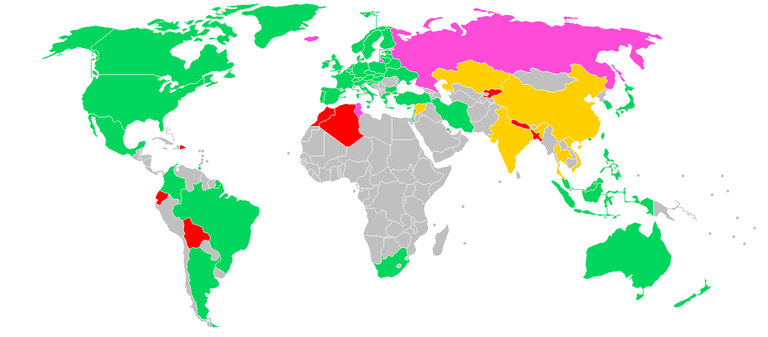State of Crypto Acceptance Internationally
A number of countries are still discovering or in the process of deciding what to do with the gradual adoption of crypto by the general public as it gains popularity and traction. The biggest challenge is probably the inability to classify crypto as a source of income or as a held asset for the sake of taxation.
No doubt, some individuals have made a handsome sum engaging in crypto, and others are using it for shady activities like money laundering, trafficking whatever can be trafficked, giving it a bad rep.
The image below shows the countries that accept the use of crypto (in green), where it is restricted or conditional (yellow) where laws are still being defined (magenta), and where it is illegal (red). Those in gray are neither here nor there on the matter, but that does not mean the governments are ignorant about it. This map was generated in 2014.

By wikipedia (old file can not be edited! for more than 2 years) - This image includes elements that have been taken or adapted from this file: No colonies Antarctica blank world.png.BitLegal with some fixesold wikipedia file "Legal status of bitcoin.png", CC BY-SA 4.0, https://commons.wikimedia.org/w/index.php?curid=66371897
Just recently, Russia has proposed laws that hint it may distance itself from recognizing crypto as a legal asset. However, one should declare ownership when filing tax returns. If the laws are implemented, mining and circulation of crypto will be restricted, together with advertising.
Canada has recognized cryptocurrency exchanges and payment processors as MSBs (Money Service Businesses). Crypto is defined as virtual currency according to their amended laws of Proceeds of Crime (Money Laundering) and Terrorist Financing Act passed in June 2019.
Japan still taxes transactions of crypto assets at up to 55% in a country of people who have a common custom of hoarding cash. Iran is trying to beat the effect of sanctions on its national currency by considering the use of crypto.
By looking at the different ways countries are reacting to crypto use and the threat it poses to fiat currency, one can understand the cautious approach that governments are taking in dealing with crypto.
On one hand, crypto is allowing some people to generate income from the unconventional channels that come with its use. Those who had the opportunity to mine bitcoin when it was easy to do so 'laughed all the way to the wallet' depending on how long they held on to the satoshis. Currently, mining pools seem to be the easiest way for people to benefit from mining activities, as the process currently involves a lot of power consumption per mined coins.
Other channels for making money with crypto include trading on exchanges and content creation in websites that payback in crypto according to quality of content.
Either way, it is a high time for nations to consider the potential for crypto to stimulate local economies while taking advantage of its borderless nature.